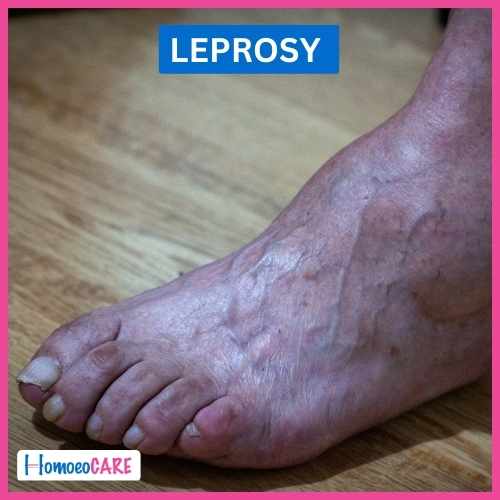Leprosy: Causes, Symptoms, Types, and Homeopathic Treatment
Introduction: Leprosy is a chronic infectious disease caused by the bacteria Mycobacterium leprae. This disease primarily affects the skin, mucous membranes, upper respiratory system, eyes, and can even involve nerves. Despite being one of the least infectious communicable diseases, leprosy has long been associated with social stigma. There is a widespread misconception that leprosy is incurable, but with proper treatment, individuals can recover and lead a normal life.
What Causes Leprosy?
Leprosy is caused by the bacterium Mycobacterium leprae. It spreads through prolonged close contact with an infected person, though it is not highly contagious. Leprosy can lead to physical disabilities and psychological impairment if left untreated. It is important to note that it is a curable disease when treated promptly with appropriate therapies.
Symptoms of Leprosy
The symptoms of leprosy can vary depending on the type but typically include:
- Painful thickening of nerves
- Skin discoloration and loss of sensation
- Thickened patches of skin
- Nasal congestion and nose bleeding
- Physical disabilities, such as numbness in the extremities, contractures, and ulceration.
If left untreated, leprosy can cause significant physical deformities and psychological distress.
Types of Leprosy
- Tuberculoid Leprosy:
- Characterized by light red or purplish skin lesions.
- It is a more benign form of leprosy.
- Often involves nerve damage, leading to numbness, contractures, and ulceration of the extremities.
- Lepromatous Leprosy:
- Involves yellow or brown infiltrated nodules on the skin.
- It affects mucous membranes, especially in the eyes, nose, and throat.
- This type leads to skin thickening, particularly in the face and ears.
Homeopathic Treatment for Leprosy
Homeopathy offers a personalized approach to treating leprosy by addressing the root causes and individual symptoms of the disease. Unlike conventional treatments, homeopathy works on a deeper level, aiming to restore balance within the body and prevent long-term complications.
At HomoeoCARE, we have successfully treated lepromatous leprosy in a 23-year-old female. After following a tailored homeopathic treatment plan, she was able to lead a normal life, free from the physical and emotional burden of leprosy.
Conclusion
Leprosy is a treatable disease, and with the right approach, it is possible to manage the symptoms and prevent complications. Homeopathic treatment focuses on the individual’s unique needs and can help heal leprosy at its core. With HomoeoCARE, leprosy is no longer a stigma, and people can find hope for a normal, healthy life.

